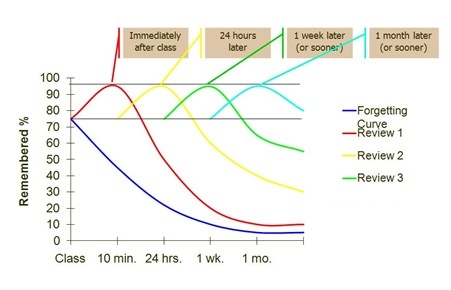Recently I have been looking into the research around the most effective study strategies. The one strategy that comes out on top is known as distributed practice. It means quite simply that revising content we have been taught regularly, spaced out over time, will yield much better exam results than simply cramming content a few days beforehand.
The literature indicates that around 60 - 80% of what is taught in class is largely forgotten within 24 hours. This is a feature of our highly efficient brains discarding information from our short-term memory into the trash can that is deemed to be of little importance.
However, if a student is exposed again to the same content shortly after, and thereafter in spaced intervals, they are likely to retain most of what was taught. The brain realises the information must be significant and it moves into the long-term memory.

What does this mean for learning and our students? It means that when a student has finished their homework, or claims they have not received any homework, there is still work to be done! It needn’t take more than 30 minutes or 5 minutes per lesson. They could simply write 2-3 dot points summarising the key content they were taught.
On the weekend they could take these dot point summaries and write them out into a mind map or longer response. A month later they could again write a summary of these or create some flash cards.
In short, cramming is crazy, but regular revision rocks!

